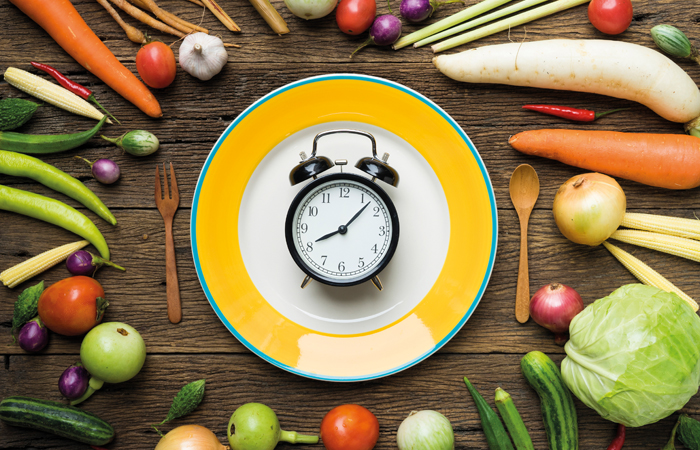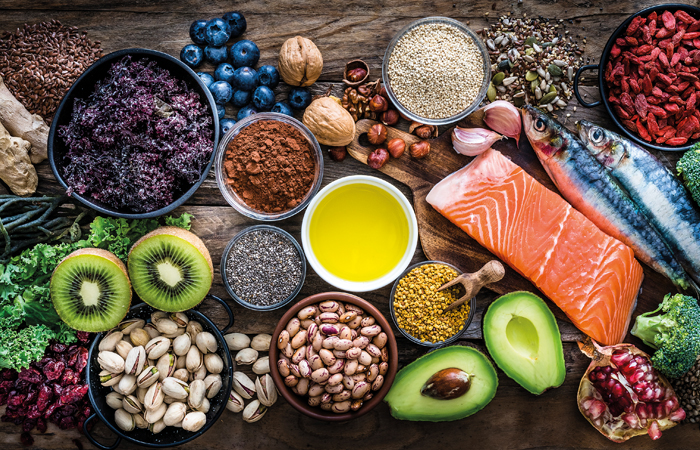Clock watch
In Conditions
Follow this topic
Bookmark
Record learning outcomes
Watching what we eat has long been the cornerstone of dieting and keeping healthy but new research suggests there might be more to managing weight than simply what we tuck into
It might not be what we eat but when we eat that makes us pile on the pounds, a new study published in the American Journal of Clinical Nutrition suggests. Researchers explored whether there is any evidence that eating later in the day causes weight gain and what impact an individual’s body clock has on food consumption. So what did the research entail and what can it tell us about weight management?

The research
Researchers monitored the eating and sleeping habits of 110 university students to find out whether there was an association between daily eating patterns, body weight and their circadian rhythm – the 24-hour internal clock that runs in the background of our brains and cycles between sleepiness and alertness. The students were given activity monitors to wear and were asked to log pictures of the food they ate and when they ate it through a mobile app, as well as record their sleeping habits.
The beginning of the sleep cycle was calculated by the onset of melatonin release of each student. Levels of melatonin – the hormone that prompts the body to wind down and prepare for sleep – start to rise about two hours prior to sleep.
The researchers also studied the students’ body composition. They found that the students with a higher body fat percentage ate most of their calories shortly before going to sleep when melatonin levels were high, compared to individuals with lower percentages of body fat.
The results
The study’s lead author Andrew McHill, researcher with the Division of Sleep and Circadian Disorders at Brigham and Women’s Hospital, said: “We found that the timing of food intake relative to melatonin onset, a marker of a person’s biological night, is associated with higher per cent body fat and BMI (body mass index), and not associated with the time of day, amount or composition of food intake. These findings suggest that the timing of when you consume calories, relative to your own biological timing may be more important for health than the actual time of day.”
The issue of timing of food intake on our health is an emerging area of research, says Bridget Benelam, nutrition communications manager, British Nutrition Foundation.
“This study is interesting as it found that eating closer to the body’s internal night-onset signals, although not the actual time of day, seemed to be associated with higher body fat, regardless of the calorie intake or the composition of meals,” she explains. “The researchers looked at the point in the day by which the participants had eaten half of their calories rather than how late they ate.
“However, it’s important to note that it’s a single study over 30 days, all in young adults who on average had a healthy weight. So we would need more research to demonstrate whether this would be the case in larger groups across different age ranges and over the longer term.”
The wider picture
Bridget says it is possible that when we eat does have implications for our health, however for most individuals in the UK, what we eat is far more important to our health than the time we eat.
Pharmacy teams advising customers who want to improve their diets should recommend reducing calories if an individual is overweight and in general that people should eat a healthy diet, she says.
An analysis of the study by NHS Choices says the new research adds to previous evidence suggesting it’s good to consume more of our calories earlier in the day, when we have more opportunities to be active ahead of us. Eating large, heavy meals late in the evening has also been linked with higher body fat and so people should consider whether doing this regularly is really the best thing for their health and wellbeing.
Victoria Taylor, British Heart Foundation dietitian, says eating late at night may influence a person’s cholesterol and triglyceride levels (a type of fat in the blood) as well as their BMI. “As well as thinking about what they put on their plate, people should also be aware of their patterns of eating, cutting down on late night snacking wherever possible, and make sure they are getting enough sleep.”
Holistic advice
When advising customers about reducing their risk of heart and circulatory disease, pharmacy teams should recommend that people think about their whole diet. “Eating a traditional Mediterranean-style diet is a good way to describe this – plenty of fruit and veg, whole grains, pulses and beans, fish, nuts, unsaturated oils and not too much meat or fatty and sugary foods. Combined with a healthy lifestyle, which includes regular physical activity and not smoking, this will improve heart and circulatory health and decrease the risk of having a heart attack or stroke,” says Victoria.
Eating late at night may also affect blood sugars both overnight and the next morning. The chances are, if people are reaching for a snack late at night they are less likely to be tucking into a piece of fruit or other healthy snack. Eating too many high carbohydrate, high calorie foods that the body cannot burn off will lead to weight gain and this is one of the primary risk factors for type 2 diabetes – a condition in which over 90 per cent of people are overweight.
Diabetes UK advises that it is important that people follow a healthy balanced diet when looking at reducing their risk of developing type 2 diabetes. Around three in five cases of type 2 diabetes can be prevented or delayed by maintaining a healthy weight, eating well and being active.

Support in the community
Losing weight is a complex problem, but Neil Stewart, pharmacist at Well, says: “Pharmacy staff are ideally placed to build relationships with their customers, and once that trust is established, the pharmacy team can initiate conversations about the health risks of being overweight and obese,” he says. “Pharmacy teams can ensure weight management leaflets are clearly on display in their health promotion zone, in order to encourage customers to start these conversations themselves.”
Once patients are ready to move forwards, Neil says pharmacy teams can “provide advice on healthy eating and food labelling, educate them on the benefits of regular exercise and suggest the most suitable forms of exercise for that individual, advise on the slimming aids and calorie-controlled meal replacements available for sale in the pharmacy and consult on the free NHS Weight Management Service. Pharmacy teams can also check BMI, waist measurement and blood pressure in store, set SMART (specific, measurable, attainable, realistic and timely) health goals with the patients, and provide regular one-to-one support to help the patient achieve their goals.”
With one in four adults and one in five children now obese in the UK, Neil highlights the importance of these interventions in helping people reduce their risk of diabetes, heart disease, cancer and stroke. He says: “This is the second most common preventable cause of death after smoking, and tackling it in the community can help save lives and reduce the strain on the NHS.”
The other end of the spectrum
Weight management isn’t just about reducing weight, as being underweight can also be a health problem for some people.
Bridget Benelam, the British Nutrition Foundation’s nutrition communications manager, says: “People who are underweight tend to be so for a multitude of reasons: certain medications can decrease appetite as can periods of stress or mental ill health, whilst some illnesses can result in weight loss, either as a result of the illness or being too ill to eat. However sometimes people have a high metabolism and naturally have a low body weight.”
Health risks of being underweight include:
- A compromised immune system, which can increase the risk of becoming ill
- Less body fat reserves if people do become unwell and cannot eat for a period of time
- Increased risk of nutrient deficiencies, which can lead to other health conditions. For example, too little calcium can increase the risk of developing osteoporosis and too little iron can lead to anaemia
- Reduced menstruation, which can affect fertility.
Neil Stewart, pharmacist at Well, says a BMI below 18.5 and feeling tired indicate that someone is underweight. Pharmacy staff can help to identify these customers and initiate conversations to understand the potential causes. Anyone with unexplained weight loss should be referred to a GP. Staff can also educate customers on the risks of being underweight and support them to reach a healthy weight goal.
Tips to gain weight include:
- Eat foods which are rich in nutrients such as energy and protein, for example malt loaf, beans on toast, filled jacket potatoes, stews and rice puddings, but avoid high calorie foods with few nutrients such as biscuits and cakes
- Eating little and often can sometimes be easier
- Drink nourishing drinks such as hot chocolate, milkshakes and smoothies. Yoghurt, custard and soups can help if chewing is a problem and smooth foods are needed.
For most individuals in the UK, what we eat is far more important to our health than the time we eat
